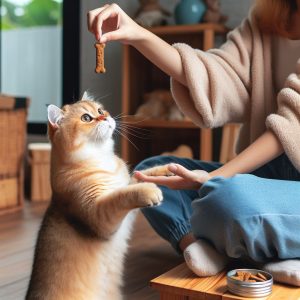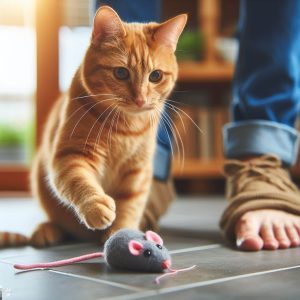Diarrhea is one of the most common health issues that cat parents have to deal with. Loose, watery stools can occur due to various factors like food intolerances, infections, intestinal parasites, inflammation, and stress.
While most acute cases resolve quickly, diarrhea can sometimes persist longer and lead to dangerous dehydration, especially in kittens and senior cats.
When confronted with this messy problem, most cat owners want to know – what can I safely give my cat at home to firm up their stools? One natural remedy that often comes up is pumpkin.
This guide will cover everything you need to know about using pumpkin for cat diarrhea.
What Makes Pumpkin an Effective Remedy?
Pumpkin may seem unconventional, but this humble gourd is packed with beneficial properties that make it highly effective for feline digestive issues.
Rich in Soluble Fiber
- The soluble fiber in pumpkin absorbs excess moisture and adds bulk to stool.
- This firms up loose stools by soaking up liquid and binding the waste together.
- It also slows digestion, allowing more water absorption.
- Pectin is the main soluble fiber in pumpkin that forms a gel-like matrix to bulk up stool.
Contains Essential Vitamins and Minerals
Pumpkin provides vital nutrients like:
- Vitamin A to stimulate immunity
- Vitamin C to act as an antioxidant
- Potassium for fluid balance
- Iron to carry oxygen to tissues
- Magnesium to support enzymes and electrolytes
These nutrients optimize gut health and reduce inflammation.
Low in Calories and Fat
Pumpkin is low in fat and calories. This makes it safe to feed generously to cats with diarrhea without worrying about weight gain.
Has Antioxidants
Antioxidants like beta-carotene and Vitamin C help reduce oxidative damage and fight infection.
Soothes the Stomach
Compounds in pumpkin called cucurbitacins decrease inflammation and contractions in the gut. This allows inflamed areas to heal.
Acts as a Prebiotic
The fiber in pumpkin feeds healthy probiotic bacteria like lactobacilli and bifidobacteria. This improves digestion and strengthens the gut barrier against pathogens that cause diarrhea.
In essence, pumpkin quickly bulks up loose stools while also restoring optimal gut function with its nutrients and prebiotic effect. This makes it highly effective for both treating acute diarrhea and preventing future episodes.
How Does Pumpkin Help Treat Diarrhea?
Pumpkin helps manage feline diarrhea in three main ways:
1. Adds Bulk and Binds Stools
The soluble fiber absorbs excess moisture from the stools and gives them more solid form and mass. This firms up loose stools and provides immediate relief.
2. Soothes Intestinal Inflammation
Compounds in pumpkin have an anti-inflammatory effect on the gut lining. This allows inflamed areas to heal.
3. Restores Beneficial Gut Bacteria
The prebiotics in pumpkin feed good bacteria like lactobacilli. This improves gut health and optimal stool consistency while preventing overgrowth of harmful bacteria.
In summary, pumpkin’s fiber relieves acute symptoms, the anti-inflammatory action heals the gut, and prebiotics prevent recurrent diarrhea – making it a comprehensive dietary aid.
What Types of Diarrhea Can Pumpkin Help With?
Pumpkin can provide relief for various causes of feline diarrhea including:
- Dietary indiscretion from eating unsuitable human food or trash
- Food allergies or intolerances
- Transitioning to a new diet
- Foreign material like hairballs irritating the gut
- Parasites like giardia
- Inflammatory bowel disease
- Stress-related diarrhea
However, if symptoms persist beyond 2 days or appear severe, veterinary attention is still required even when using pumpkin.
When Should Pumpkin Be Avoided?
While suitable for many causes, there are some situations where pumpkin is not recommended:
- Severe bloody diarrhea
- Underlying diseases requiring prescription treatment
- Kittens under 12 weeks old
- Immune-compromised cats
So while very useful for a wide spectrum of diarrhea causes, pumpkin does not replace veterinary medicine when a disease or serious condition requires proper diagnosis and tailored treatment.
What is the Ideal Pumpkin Dosage for Cats?
Pumpkin can be given generously due to its low calories. But too much can lead to constipation.
For Kittens:
- Under 12 weeks – Do not give without vet approval
- 3 to 6 months – 1 teaspoon per meal
- 6 to 12 months – 1 tablespoon per meal
For Adult Cats:
- Small cats – 1 tablespoon per meal
- Medium cats – 2-3 tablespoons per meal
- Large cats – Up to 1/4 cup per meal
For Senior Cats:
- Start with 1 teaspoon per meal
- Give slightly less than adult dosage
Start with smaller doses, gradually increase over 2-3 days, and tailor dosage based on your cat’s response and stool consistency.
Tips for Giving Pumpkin to Cats
Here are some tips for successfully administering pumpkin:
- Purchase plain canned or cooked fresh pumpkin with no added sugars or spices
- Warm canned puree to room temperature before serving
- Mix into wet food to hide texture and taste
- Make a smoothie with bone broth to encourage hydration
- If needed, syringe small amounts into the mouth
- Be patient and don’t force feed if your cat refuses
With persistence and the right technique, your cat will start eating the pumpkin-food mixture willingly!
How Long Does Pumpkin Take to Work?
Due to the soluble fiber, pumpkin works relatively quickly to firm up loose stools:
- Within 12 hours – Decreased diarrhea frequency and improved energy
- 24 hours – Stools become thicker and more formed
- 2-3 days – Fully normal stools and appetite
However, response time varies based on the severity, underlying cause, proper dosage, age, and health status of your cat. Monitor litterbox habits closely and give pumpkin consistently for at least 2-3 days before expecting substantial improvement.
Why Might Pumpkin Be Ineffective?
While pumpkin can help most cats, there are some reasons it may not work:
- Incorrect dosage
- Not given consistently
- Severe underlying health problem
- Primary food allergy or intolerance
- Concurrent medication interactions
- Too quickly transitioning food
- Severe stress causing persistent diarrhea
If diarrhea continues or worsens with correct pumpkin usage, take your cat to the vet for proper diagnosis and treatment. There may be an underlying factor complicating its effectiveness.
Are There Any Risks of Pumpkin for Cats?
Pumpkin is very safe for most cats if given properly. But monitor for these side effects:
- Upset stomach
- Dehydration and constipation
- Intestinal blockage from fresh pumpkin strings
- Allergies to pumpkin
- Drug interactions
Discontinue use and call your vet if you notice any concerning symptoms like vomiting, straining or lethargy.
When is Veterinary Care Essential?
While pumpkin can help manage uncomplicated diarrhea at home, contact your vet promptly if you notice:
- Diarrhea lasting over 48 hours
- Blood, mucus or odd color in stool
- Severe vomiting or appetite loss
- High fever, lethargy, abdominal pain
- Straining or pain when defecating
- Weight loss or poor growth in kittens
Pumpkin can provide some relief until veterinary care is received, but it does not replace medical treatment when a disease or serious condition causes diarrhea.
Other Helpful Home Remedies
Other remedies to try under vet guidance along with pumpkin:
- Probiotic supplements
- Slippery elm
- Bone broth
- White rice
- Omega-3 fatty acids
- Marshmallow root
However, always have your vet review any new supplement, herb or medication before giving it to your cat.
Bottom Line
In summary, pumpkin is an accessible, affordable natural remedy that can effectively provide relief from diarrhea in cats when used properly under veterinary supervision. Its soluble fiber quickly firms up loose stools while its nutrients and prebiotics promote gut health. While very useful for a wide range of causes, pumpkin should never replace prompt veterinary care for bloody diarrhea, severe dehydration, or suspected underlying illness. When incorporated as part of a holistic treatment plan, pumpkin can get your cat’s digestion comfortably back on track.



